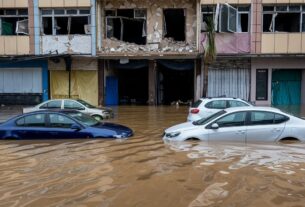The growing need for environmental insurance is becoming increasingly evident as pollution liability continues to pose significant risks to businesses and individuals alike. As concerns about climate change, deforestation, and pollution mount, the importance of environmental insurance cannot be overstated. Environmental insurance, particularly pollution liability insurance, is designed to provide financial protection against unforeseen environmental disasters, making it an essential tool for companies and individuals seeking to mitigate potential losses.
The impact of environmental disasters can be far-reaching and devastating, resulting in significant financial losses, damage to reputation, and even loss of life. The ongoing debate about climate change and environmental sustainability has led to increased scrutiny of companies’ environmental practices, making it crucial for businesses to prioritize environmental responsibility. Environmental insurance can provide a safety net against unforeseen events, such as oil spills, toxic waste dumping, and other forms of pollution, which can have severe consequences on the environment and human health.
Environmental pollution is a pressing concern that affects not only the natural world but also has severe implications for human health and the economy. The need for effective environmental insurance policies that address pollution liability has never been more pressing. As the world grapples with the challenges of environmental sustainability, it is essential to understand the role of environmental insurance in mitigating the risks associated with pollution. By providing financial protection against environmental disasters, environmental insurance can play a critical role in promoting environmental responsibility and sustainability.
Understanding Environmental Insurance and Pollution Liability
Environmental insurance is a type of insurance policy designed to provide financial protection against environmental disasters, including pollution, contamination, and other forms of environmental damage. Pollution liability insurance is a subset of environmental insurance that specifically addresses the risks associated with pollution, including Bodily Injury, Property Damage, and Environmental Damage. This type of insurance policy can provide coverage for a wide range of environmental hazards, including oil spills, toxic waste dumping, and other forms of pollution. By providing financial protection against unforeseen environmental disasters, pollution liability insurance can help mitigate the risks associated with pollution and promote environmental responsibility.
The importance of environmental insurance cannot be overstated, particularly in industries that are prone to environmental disasters, such as oil and gas, manufacturing, and construction. Companies that operate in these industries are at risk of facing significant financial losses and reputational damage in the event of an environmental disaster. Environmental insurance can provide a safety net against such events, helping companies to recover quickly and minimize the impact on their operations. Moreover, environmental insurance can also provide coverage for the costs associated with cleanup and restoration, which can be substantial. By providing financial protection against environmental disasters, environmental insurance can play a critical role in promoting environmental sustainability and responsible business practices.
The Growing Need for Environmental Insurance
The growing need for environmental insurance is driven by several factors, including increased regulatory scrutiny, rising public awareness, and the growing importance of environmental sustainability. Governments around the world are implementing stricter environmental regulations, which can result in significant fines and penalties for companies that fail to comply. Environmental insurance can provide financial protection against such risks, helping companies to avoid costly fines and reputational damage. Moreover, the growing public awareness of environmental issues has led to increased pressure on companies to prioritize environmental responsibility, making environmental insurance an essential tool for companies seeking to demonstrate their commitment to sustainability.
The impact of environmental disasters can be far-reaching and devastating, resulting in significant financial losses, damage to reputation, and even loss of life. The ongoing debate about climate change and environmental sustainability has led to increased scrutiny of companies’ environmental practices, making it crucial for businesses to prioritize environmental responsibility. Environmental insurance can provide a safety net against unforeseen events, such as oil spills, toxic waste dumping, and other forms of pollution, which can have severe consequences on the environment and human health. By providing financial protection against environmental disasters, environmental insurance can play a critical role in promoting environmental sustainability and responsible business practices.
Types of Environmental Insurance Policies
There are several types of environmental insurance policies available, each designed to address specific environmental risks. Pollution liability insurance is one of the most common types of environmental insurance policies, providing coverage for Bodily Injury, Property Damage, and Environmental Damage resulting from pollution. Other types of environmental insurance policies include environmental impairment liability insurance, which provides coverage for environmental damage resulting from business operations, and cyber liability insurance, which provides coverage for cyber-attacks that result in environmental damage. Companies should carefully consider their environmental risks and choose an insurance policy that provides adequate coverage for their specific needs.
Environmental insurance policies can be tailored to meet the specific needs of companies, providing coverage for a wide range of environmental hazards. For example, companies that operate in industries that are prone to environmental disasters, such as oil and gas, may require specialized insurance policies that provide coverage for specific environmental risks. Environmental insurance brokers can help companies navigate the complex world of environmental insurance, providing expert advice and guidance on choosing the right policy. By working with an environmental insurance broker, companies can ensure that they have adequate coverage for their environmental risks and are prepared for any eventuality.
The cost of environmental insurance policies can vary widely, depending on the type of policy, the level of coverage, and the company’s environmental risks. Companies should carefully consider their environmental risks and choose an insurance policy that provides adequate coverage for their specific needs. Environmental insurance brokers can help companies navigate the complex world of environmental insurance, providing expert advice and guidance on choosing the right policy. By working with an environmental insurance broker, companies can ensure that they have adequate coverage for their environmental risks and are prepared for any eventuality.
Benefits of Environmental Insurance
The benefits of environmental insurance are numerous, providing companies with financial protection against environmental disasters, promoting environmental responsibility, and enhancing their reputation. Environmental insurance can provide a safety net against unforeseen events, such as oil spills, toxic waste dumping, and other forms of pollution, which can have severe consequences on the environment and human health. By providing financial protection against environmental disasters, environmental insurance can help companies recover quickly and minimize the impact on their operations. Moreover, environmental insurance can also provide coverage for the costs associated with cleanup and restoration, which can be substantial.
Environmental insurance can also promote environmental responsibility by encouraging companies to prioritize environmental sustainability. By providing financial protection against environmental disasters, environmental insurance can incentivize companies to adopt environmentally responsible practices, reducing the risk of environmental damage and promoting sustainable development. Moreover, environmental insurance can also enhance a company’s reputation, demonstrating their commitment to environmental sustainability and responsible business practices. By prioritizing environmental responsibility, companies can build trust with their stakeholders, including customers, investors, and regulators, which can lead to long-term benefits, including increased revenue and market share.
The importance of environmental insurance cannot be overstated, particularly in industries that are prone to environmental disasters, such as oil and gas, manufacturing, and construction. Companies that operate in these industries are at risk of facing significant financial losses and reputational damage in the event of an environmental disaster. Environmental insurance can provide a safety net against such events, helping companies to recover quickly and minimize the impact on their operations. Moreover, environmental insurance can also provide coverage for the costs associated with cleanup and restoration, which can be substantial. By providing financial protection against environmental disasters, environmental insurance can play a critical role in promoting environmental sustainability and responsible business practices.
Challenges and Opportunities in Environmental Insurance
The environmental insurance market is rapidly evolving, with new challenges and opportunities emerging all the time. One of the significant challenges facing the environmental insurance market is the lack of standardization, which can make it difficult for companies to compare policies and choose the right coverage. Moreover, the environmental insurance market is also subject to regulatory changes, which can impact the availability and cost of coverage. Despite these challenges, the environmental insurance market also presents significant opportunities, particularly for companies that prioritize environmental sustainability and responsible business practices.
Environmental insurance can play a critical role in promoting environmental sustainability and responsible business practices, providing financial protection against environmental disasters and incentivizing companies to adopt environmentally responsible practices. By prioritizing environmental responsibility, companies can build trust with their stakeholders, including customers, investors, and regulators, which can lead to long-term benefits, including increased revenue and market share. Moreover, environmental insurance can also provide coverage for the costs associated with cleanup and restoration, which can be substantial. By providing financial protection against environmental disasters, environmental insurance can help companies recover quickly and minimize the impact on their operations.
The future of environmental insurance looks promising, with new technologies and innovations emerging all the time. For example, the use of drones and satellite imaging can help companies monitor their environmental risks more effectively, reducing the likelihood of environmental disasters. Moreover, the development of new insurance products, such as parametric insurance, can provide companies with more flexible and cost-effective coverage options. By leveraging these technologies and innovations, companies can better manage their environmental risks and promote environmental sustainability, reducing the likelihood of environmental disasters and minimizing their impact on the environment and human health.
Conclusion
In conclusion, the growing need for environmental insurance is becoming increasingly evident as pollution liability continues to pose significant risks to businesses and individuals alike. Environmental insurance, particularly pollution liability insurance, is designed to provide financial protection against unforeseen environmental disasters, making it an essential tool for companies and individuals seeking to mitigate potential losses. By providing financial protection against environmental disasters, environmental insurance can promote environmental responsibility, enhance a company’s reputation, and provide a safety net against unforeseen events.
The importance of environmental insurance cannot be overstated, particularly in industries that are prone to environmental disasters, such as oil and gas, manufacturing, and construction. Companies that operate in these industries are at risk of facing significant financial losses and reputational damage in the event of an environmental disaster. Environmental insurance can provide a safety net against such events, helping companies to recover quickly and minimize the impact on their operations. Moreover, environmental insurance can also provide coverage for the costs associated with cleanup and restoration, which can be substantial. By providing financial protection against environmental disasters, environmental insurance can play a critical role in promoting environmental sustainability and responsible business practices.



